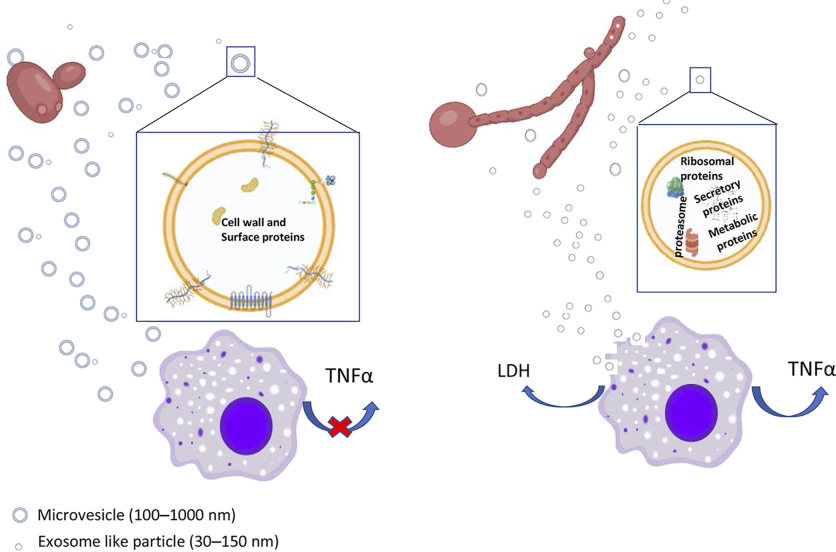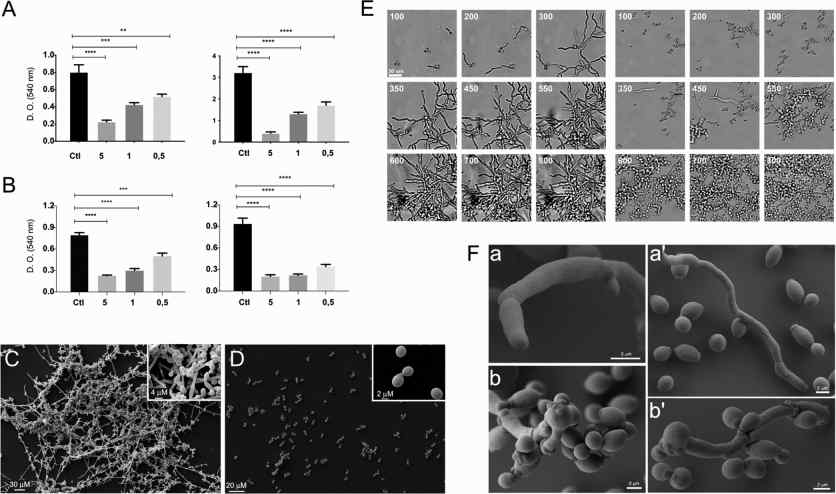Candida albicans-derived Exosome Research and Application
Candida albicans is a widely prevalent pathogenic fungus capable of causing infections in humans. The exosomes it secretes play a crucial role in its pathogenic mechanisms, modulation of host immune responses, and the formation of drug resistance. Studies have revealed that these vesicles are rich in biomolecules, including proteins, lipids, and genetic material. They not only serve as a bridge for communication between the fungus and the host but also exhibit great potential as vaccine candidates. Creative Biolabs is committed to supporting clients in conducting deeper research to fully explore and utilize the potential of these exosomes.
Candida albicans-derived Exosomes: Key Communication Mediators
1. Cell Wall Protein Transfer and Host Immune Response:
Candida albicans has both yeast and hyphal forms. Exosomes released from both forms can elicit an immune response in patients with invasive candidiasis. However, they differ in size and protein diversity. Exosomes derived from the yeast form mainly contain cell wall proteins, aiding in cell wall maintenance. In contrast, those from the hyphal form contain more intracellular proteins and proteins related to pathogenicity, being more invasive in modulating host immune responses. For example, exosomes from the hyphal form can stimulate the host immune system to induce the release of tumor necrosis factor-alpha, indicating their different roles in host immune responses.1
 Fig.1 Schematic representation of the main differences observed between hyphal extracellular vesicles and yeast extracellular vesicles.1,3
Fig.1 Schematic representation of the main differences observed between hyphal extracellular vesicles and yeast extracellular vesicles.1,3
2. Biofilm Formation and Regulation of Hyphal Transition:
Candida albicans-derived exosomes play a role in biofilm formation and morphological transformation of Candida albicans. Exosomes from the yeast form inhibit the yeast-to-hyphae transition through complexes containing specific lipid compounds (such as sesquiterpenes, diterpenes, and fatty acids). They can inhibit biofilm formation, prevent or reverse hyphal formation, and promote the formation of multibud pseudohyphae.2
 Fig.2 Extracellular vesicles from Candida albicans inhibit biofilm formation and yeast-to-hyphae differentiation.2,3
Fig.2 Extracellular vesicles from Candida albicans inhibit biofilm formation and yeast-to-hyphae differentiation.2,3
3. Self-Growth Regulation:
Candida albicans-derived exosomes promote the growth of Candida albicans by activating the L-arginine/nitric oxide pathway, increasing nitric oxide release levels, reducing reactive oxygen species within the fungal body, and inhibiting fungal apoptosis. These vesicles enhance the destructive effect of Candida albicans on host cells, demonstrating their significant role in the growth and enhanced pathogenicity of Candida albicans.3
4. Protein Tagging and Biosynthetic Pathways:
Research has identified specific protein markers of Candida albicans-derived exosomes, such as Sur7 family proteins, which help to gain a deeper understanding of exosome biosynthesis and cargo loading, and thereby elucidate their role in the pathogenicity of Candida albicans.4
Potential of Candida albicans-derived Exosomes
Based on the above findings, Candida albicans-derived exosomes show a wide range of application potential in medical research. With further research, they may pave new ways for the prevention and treatment of candidiasis, bringing new strategies for diagnosis, therapy, and prevention of such infections:
-
Development of Diagnostic Markers: Since Candida albicans-derived exosomes contain specific protein markers and molecular patterns, they could serve as biomarkers for diagnosing Candida albicans infections. Particularly in early diagnosis and infection monitoring, these exosomes may help improve clinical outcomes.
-
Vaccine Candidates: As Candida albicans-derived exosomes carry pathogen-specific proteins and molecules capable of inducing an immune response, they could be used as vaccine candidates. By stimulating the host's immune system to recognize and attack fungal pathogens, they may offer a new strategy for infection prevention.
-
Biofilm Inhibition Strategy Formation: Candida albicans exosomes play an important role in the formation and maintenance of biofilms. Understanding this process could help develop strategies to intervene or block biofilm formation, which is significant for antibiotic resistance formation and chronic infections.
Creative Biolabs believes that future research will unveil the mysterious functions of Candida albicans exosomes, further promoting their innovative application and development in the clinical field. We have established an advanced research platform for microbe-derived exosomes. If you are interested or in need, please feel free to contact us.
Microorganism-derived Exosome Isolation and Identification
In Vitro Functional Discovery of Microorganism-derived Exosomes
In Vivo Functional Discovery of Microorganism-derived Exosomes
References
-
Martínez-López, R.; et al. Candida albicans hyphal extracellular vesicles are different from yeast ones, carrying an active proteasome complex and showing a different role in host immune response. Microbiology Spectrum. 2022, 10(3):e0069822.
-
Honorato, L.; et al. Extracellular vesicles regulate biofilm formation and yeast-to-hypha differentiation in Candida albicans. mBio. 2022, 13(3):e0030122.
-
under Open Access license CC BY 4.0, without modification.
For Research Use Only. Cannot be used by patients.
Related Services:

 Fig.1 Schematic representation of the main differences observed between hyphal extracellular vesicles and yeast extracellular vesicles.1,3
Fig.1 Schematic representation of the main differences observed between hyphal extracellular vesicles and yeast extracellular vesicles.1,3
 Fig.2 Extracellular vesicles from Candida albicans inhibit biofilm formation and yeast-to-hyphae differentiation.2,3
Fig.2 Extracellular vesicles from Candida albicans inhibit biofilm formation and yeast-to-hyphae differentiation.2,3









